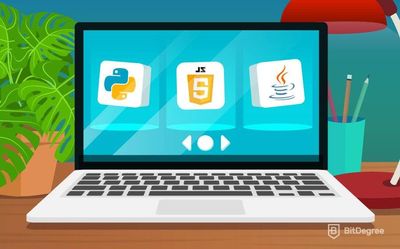 If you’d ask a regular person off the street which type of an operating system does he use, the most common answers would probably be either Windows or Apple. In comparison, probably very few of those people would say that they use or have used Linux. In contrast, however, a lot of programmers would tend to argue - Linux is often celebrated as one of the best operating systems to use for programmers. A lot of programming-related jobs require you to be able to use Linux. That’s why today, we’ll talk about some of the most popular Linux interview questions.
If you’d ask a regular person off the street which type of an operating system does he use, the most common answers would probably be either Windows or Apple. In comparison, probably very few of those people would say that they use or have used Linux. In contrast, however, a lot of programmers would tend to argue - Linux is often celebrated as one of the best operating systems to use for programmers. A lot of programming-related jobs require you to be able to use Linux. That’s why today, we’ll talk about some of the most popular Linux interview questions.
This tutorial will include basic Linux interview questions in the beginning, and then the more advanced stuff later on. The guide isn’t only suitable for programmers, though - we’ll also overview some of the more popular Linux administrator interview questions.
Table of Contents
- 1. Key Linux Questions
- 1.1. Question 1: What is Linux?
- 1.2. Question 2: Why would anyone use Linux?
- 1.3. Question 3: What’s ‘Kernel’?
- 1.4. Question 4: What are the main differences between Linux and Unix?
- 1.5. Question 5: What’s LILO?
- 1.6. Question 6: What is a ‘root account’?
- 1.7. Question 7: Explain ‘swap space’.
- 1.8. Question 8: What’s the difference between ‘relative path’ and ‘absolute path’?
- 1.9. Question 9: What is a ‘symbolic link’?
- 1.10. Question 10: Explain the three owner types in Linux.
- 1.11. Question 11: What is a ‘hard link’?
- 1.12. Question 12: How many characters can a file name have?
- 1.13. Question 13: What does ‘redirection’ do?
- 1.14. Question 14: What’s a ‘zombie process’?
- 1.15. Question 15: What’s an ‘inode’?
- 2. Linux Interview Questions - Advanced
- 2.1. Question 1: How would you terminate a process?
- 2.2. Question 2: What is ‘Shell scripts’?
- 2.3. Question 3: What is “GREP”?
- 2.4. Question 4: How can your track events on your system?
- 2.5. Question 5: How can you grant permission?
- 2.6. Question 6: What are ‘GSVs’?
- 2.7. Question 7: What is a ‘whoami’ command?
- 2.8. Question 8: What is a ‘partial backup’?
- 2.9. Question 9: What is ‘CLI’?
- 2.10. Question 10: What is ‘GUI’?
- 2.11. Question 11: What is “comm” used for?
- 2.12. Question 12: What command would you use to have your processor use less time?
- 2.13. Question 13: How can you make certain commands run at a later time?
- 2.14. Question 14: What does ‘nuhup’ do?
- 2.15. Question 15: What does ‘cd’ do?
- 3. Summary
- 4. Conclusions
Key Linux Questions
As I’ve mentioned, the tutorial will be split into two main parts - basic Linux interview questions and the more advanced stuff. Even if you’re quite familiar with Linux, I’d still advise you to at the very least skim through the basic questions and answers. This way, you’ll form an idea of what to expect at the beginning of the interview.
Latest Deal Active Right Now:
EXCLUSIVE 25% OFF
On DataCamp Subscriptions
Follow the Datacamp promo code link & get an exclusive 25% OFF Datacamp subscriptions. Act now while the offer is still available!
Question 1: What is Linux?
It’s probably of no surprise that one of the most popular first Linux interview questions that employers ask is this one. By doing so, your interviewers want to see how well you know the concept and how you can put the definition into your own words.
So, what is Linux?
Best known for the penguin mascot named Tux, Linux is an operating system based on the UNIX OS. Linux is open-source, which is considered to be one of its best features.
Question 2: Why would anyone use Linux?
Your interviewers might compare Linux with Windows or iOS, saying that the latter two are the most popular operating systems to date. So what’s the point in using Linux?
Well, Linux has quite a few advantages. I’ll give you examples of the most notable ones:
- Linux is open-source. That means that anyone can view its code and learn from it, alter it based on their wants and needs.
- It’s super safe. Linux has a few key features that place it on the top of the list when it comes to OS safety.
- Programmer’s choice. Because of its safety and built-in, customizable features, full programming language support, and special programming tools, Linux is one of the best-operating systems to use for programming.
- Free to use. Yup, you’ve read that right - Linux is completely free to download and use.
Question 3: What’s ‘Kernel’?
The Linux Kernel is a software that manages the operating system’s resources and serves as an interface for the user.
Question 4: What are the main differences between Linux and Unix?
In such and similar Linux interview questions, try to answer so that your potential employer will see that you’ve done your research.
Unix is an operating system that was designed to be copyrighted by huge corporations, while Linux is an open-source kernel that anyone can use, free of charge.
Question 5: What’s LILO?
LILO abbreviates as the “Linux Loader”. It is a loader used to quickly access the operating system’s library, which in turn makes Linux a fast OS.
Question 6: What is a ‘root account’?
Now that we’ve got some of the main definitions out of the way, we can move closer towards some of the Linux administrator interview questions.
The ‘root account’ is the same thing as an administrator account - it controls the events happening within the operating system.
Question 7: Explain ‘swap space’.
“Swap space” is just a temporary amount of memory space on Linux that is created to allow a certain program to run smoothly. Once the program has finished running, the swap space is also no more.
Question 8: What’s the difference between ‘relative path’ and ‘absolute path’?
‘Relative path’ is used to name a file's location when the specifics aren’t that important. This can be done from any directory.
On the flip side, ‘absolute path’ is used to specify the exact location of a file. This can’t usually be done from any type of a directory, only form the main ones.
Question 9: What is a ‘symbolic link’?
A great example of the basic Linux interview questions, a symbolic link in Linux is the same as a shortcut in Windows.
Question 10: Explain the three owner types in Linux.
This is one of those Linux administrator interview questions that require a bit of explanation, so let’s just jump into it.
The three types of owners are the user, the group and others. Additionally, there are three types of actions that these owners may perform - execute, read and write.
Reading allows the users to access a directory and read through its files. Writing lets owners modify the files and their directories as they see fit. Execute allows users to run files.
Question 11: What is a ‘hard link’?
This is also one of the easier Linux questions, especially if you remember what symbolic links are.
Hard links are simply the main directories of a file. An equivalent to that in Windows would be the main installed files.
Question 12: How many characters can a file name have?
This is a great example of the more clever Linux interview questions. It seems super easy, but not many people bother checking it out - that’s why employers ask it.
The maximum amount of characters that a file name in Linux may have is 255.
Question 13: What does ‘redirection’ do?
Even though this falls more into the realm of Linux commands interview questions (which are mostly covered in the “advanced” section of this tutorial), it’s a very self-explanatory sort of a question.
Redirection allows you to, well… redirect one output on to another. I told you it was self-explanatory.
Question 14: What’s a ‘zombie process’?
It is a process that has completed its execution, yet still can be found in the “Processes” table.
Question 15: What’s an ‘inode’?
An inode is a type of data structuring found on Linux. It works like this: imagine that you have an image. An inode would store all of the available information about your image except for its name and the actual image itself.
Linux Interview Questions - Advanced
Now that we’ve covered some of the most popular examples of the basic Linux interview questions, lets transition to the advanced stuff. This section is mostly based off of Linux commands interview questions, for those seem to occupy the latter part of the job interviews.

Question 1: How would you terminate a process?
If you wanted to terminate a single process, you would have to use the “kill” command with the attached ID of the process. If, for example, you wanted to terminate all of the processes at once, you would have to replace the “process ID” part with a “0”.
Question 2: What is ‘Shell scripts’?
Shell scripts are certain program files that execute Linux commands in a specific linear fashion.
Question 3: What is “GREP”?
“GREP” abbreviates as a “Global Regulation Expression Point”. It is used for searching a text file for commonly used expressions.
Question 4: How can your track events on your system?
You can track events by using a daemon. However, it has to be a specific daemon for it to work. In this case, it would be the “syslogd” daemon.
Question 5: How can you grant permission?
If you’re a system administrator, then you can grant permission. You would have to do so by using the “chmod” command, followed by a “+”. If you ever wanted to revoke the permission, the process would look the same. The only thing that you would have to replace is the “+” - you’d insert a “-” in its place.
Question 6: What are ‘GSVs’?
“GSV” abbreviates to “Global Shell Variables”. Otherwise known as “environmental variables”, these are the settings that all of your Linux programs follow.
Question 7: What is a ‘whoami’ command?
This is one of those Linux interview questions that you might be familiar with based on your experience with Windows. You see, this is a command used on both Windows and Linux.
The command means “who am I?” - it shows your current login and user information.
Question 8: What is a ‘partial backup’?
Sounds like one of those easy Linux interview questions? Well, a lot of people mix the answer up.
Partial back up allows you to choose specific files that you want to back up, instead of doing so with the entire system.
Question 9: What is ‘CLI’?
A “Command Line Interface”. It is the interface that you would use if you wanted to type some sort of command for Linux to execute.
Question 10: What is ‘GUI’?
Since these two Linux interview questions (GUI and CLI) are usually asked together in the job interview, I thought it would be a good idea to just quickly cover both of them.
“GUI” stands for a “Graphical User Interface”. It is an interface where you can use images to issue commands to your computer. Many people prefer this method over CLI, for it’s more gamified and easier to remember.
Question 11: What is “comm” used for?
“Comm” compares two files and searches for both common and exclusive features.
Question 12: What command would you use to have your processor use less time?
That would be the “nice” command.
You have to also set different priority numbers for the task. Your CPU will perform the tasks in order of priority, thus making it run faster and smoother.
Question 13: How can you make certain commands run at a later time?
Just like in one of the previous Linux interview questions, you would have to use a daemon.
The daemon of choice this time would be “contrab”.
Question 14: What does ‘nuhup’ do?
With the “nuhup” command, you can turn off a terminal’s warnings about an imminent logout.

- Easy to use with a learn-by-doing approach
- Offers quality content
- Gamified in-browser coding experience
- Free certificates of completion
- Focused on data science skills
- Flexible learning timetable

- High-quality courses
- Nanodegree programs
- Student Career services
- Nanodegree programs
- Suitable for enterprises
- Paid certificates of completion

- A wide range of learning programs
- University-level courses
- Easy to navigate
- University-level courses
- Suitable for enterprises
- Verified certificates of completion
Question 15: What does ‘cd’ do?
One of the more frequent Linux questions, “cd” is a command that lets you change the directory that you’re working on.
You can do so by changing to a completely new directory. However, you can also change via an absolute path or a relative path - both of which were discussed earlier in the tutorial.
Summary
Those were some of the main Linux interview questions that you might get asked during your job interview.
Naturally, there are a lot more Linux questions out there. However, these tutorials should have given you at least some sort of an idea of what you could expect going into the interview.

Most employers are looking for programmers that know how to use Linux. You are probably going to be asked extensively about a certain type of a programming language, and the interviewers might throw in some Linux interview questions on the side.
If you’re aiming for a specific Linux-based job position, however, then you should do more research. This guide can serve as a great starting point, but there are still a lot of commands and functions that have been left untouched. Do your research, study hard and you’ll ace the job interview!

Did you know?
Have you ever wondered which online learning platforms are the best for your career?
Conclusions
So - we have reached the end of the “Linux Interview Questions” tutorial. We’ve covered both the basics and some of the more advanced Linux commands interview questions.
Get some good sleep before your job interview and don’t stress. I understand that you might feel nervous or anxious, but there’s nothing to worry about.
Keep in mind that a lot of potential employers are ready to give their employees some basic training - you don’t need to be an absolute Linux expert. A lot of times the more important factor is you as a person. Employers need reliable, trustworthy and hard-working employees. If you demonstrate these features during your job interview AND the employer sees that you’re passionate about the subject, you have a pretty good chance of getting that job.
Just be yourself, stay calm and show them what you’ve got. A nice tip of advice that I can give you is to try an elaborate on almost all of the questions that you’re given. You see, if you offer blank and forgettable, one-word statements, your interviewers might view that as a lack of knowledge on your side. Always answer the question directly, but don’t be afraid to attach one or two sentences of your own experience or opinion.
Well, I hope this tutorial was useful for you, and I wish you the best of luck in scoring that Linux job!













